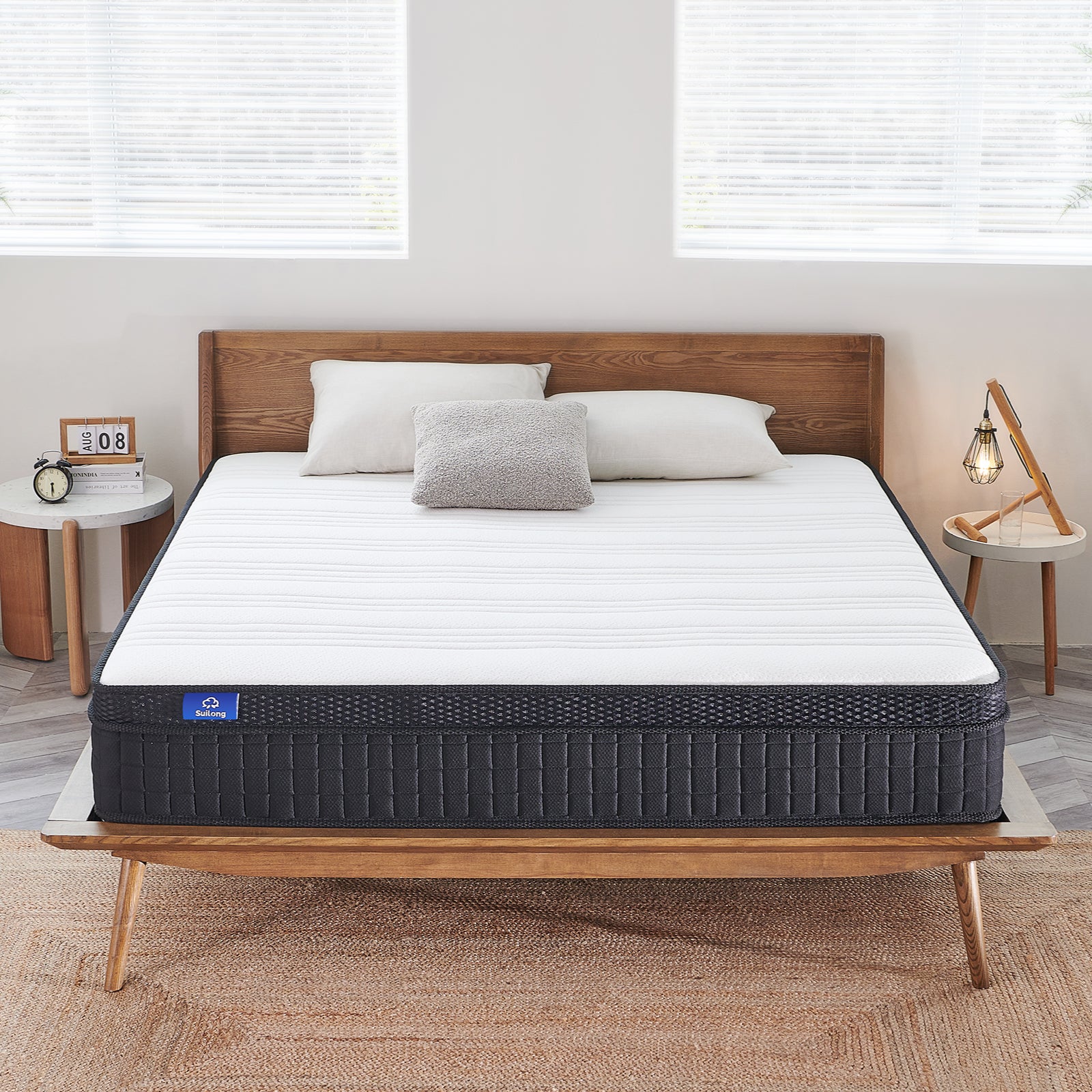Choosing the Right Mattress Thickness: A Comprehensive Guide

Choosing the right mattress is more than just about comfort; it's about ensuring a good night's sleep, aligning your spine, and supporting your body. But did you know that the thickness of your mattress plays a pivotal role in this? With the myriad of choices available, understanding mattress thickness can significantly enhance your buying decision and improve your sleep quality. Dive in to discover how the depth of your mattress can make a world of difference to your slumber.
1. Mattress Thickness Comparison: Why is this comparison so crucial?
When choosing a mattress, in addition to materials, brand, and price, mattress thickness is a factor that can't be overlooked. Different thickness levels can lead to entirely different sleeping experiences. In the following sections, I'll elaborate on the various thickness levels of mattresses and the distinct experiences they offer.
Mattress Thickness Chart
|
Thickness Range |
Suitable For |
Features |
|
≤ 10 inches |
Lightweight, Temporary Residents |
Lightweight, easy to transport, suitable for short-term use |
|
10-12 inches |
Most People |
Balanced firmness, adequate support, suitable for average-weight individuals |
|
12-14 inches |
Those Seeking Premium Comfort |
Additional layers, special fillings, provides extra support for heavier individuals |
|
> 14 inches |
Luxury Consumers |
Cutting-edge technology and materials, catering to those seeking top-level comfort |
Why is Mattress Thickness so Important?
- Balance between Support and Comfort
The thickness of a mattress is directly proportional to its supportiveness. A thicker mattress implies stronger support, particularly vital for dealing with pressure on the back and joints.
- Durability for Long-Term Use
Thicker mattresses, typically made of more material, can better withstand daily wear and tear, offering a longer lifespan.
- Personalized Choices
Mattress thickness also relates to the sleeper's weight and health conditions. For instance, heavier individuals might find that a thicker mattress offers them better support compared to a thinner one.

2. How to choose the right mattress thickness
When we consider buying a new mattress, many of us will focus on the brand, material or price. However, the thickness of the mattress is also a crucial factor which directly affects the quality of our sleep. So, how to choose the right mattress thickness?
1. Understand the characteristics of mattresses of different thicknesses
Each thickness of mattress offers solutions for specific needs and preferences:
- 10 inches and below: mattresses of this thickness are usually lighter and easier to move and store, especially for temporary living, student dormitories or guest rooms.
- 10 inches to 12 inches: this type of mattress offers a balance of comfort for most people, neither too soft nor too firm.
- 12 inches to 14 inches and up: these are luxury options, and they often include the latest mattress technology and highest quality materials for those seeking the ultimate in comfort.
2. Consider Individual Physical Needs
- Weight considerations: heavier individuals may need a thicker, firmer mattress to provide adequate support. Lighter individuals, on the other hand, may enjoy a medium or thinner mattress more.
- Health issues: Health issues such as back pain, neck pain or arthritis may influence your choice. For example, people with back problems often need a medium to firm mattress for extra spinal support.
3. Analyse your sleeping habits
Your sleeping position may affect the choice of mattress thickness:
- Side sleepers: Side sleepers usually need a slightly softer mattress to relieve pressure on the shoulders and hips.
- Back sleepers: Back sleepers may need a medium thickness that provides adequate support but also some flexibility.
- Plank: Plank sleepers tend to need a firmer mattress to prevent excessive spinal curvature.
4. Budget vs. value trade-offs
While high price doesn't necessarily equate to high quality, often, investing in a better quality, thicker mattress means it's likely to last longer and be more comfortable. Consider a mattress as a long-term investment and make sure your budget reflects the value you place on health and comfort.

3. Key factors in determining mattress thickness
The thickness of a mattress is not only about the quality of sleep we get each night, but also about our long-term health. But what exactly are the factors that determine the thickness of a mattress? Let's take a closer look at this question.
The core material of the mattress
The core material of the mattress is the primary determinant of thickness. Different materials have their own properties and thickness needs.
- Innerspring mattresses: They usually consist of hundreds to thousands of springs. In order to ensure adequate resilience and support, spring mattresses tend to have a thicker build.
- Memory foam mattresses: these rely on their characteristic responsiveness and compressibility. The thickness is usually set at a certain range in order to maintain its comfort and support.
- Latex mattresses: latex is a natural, resilient material. To take advantage of this elasticity and maintain breathability and comfort, manufacturers usually adjust its thickness.
Technology and Innovation
As technology evolves, so do the methods and materials used to manufacture mattresses. New technologies, such as pressure-reducing techniques, cooling layer designs, or the use of organic materials, may have an impact on the thickness of a mattress.
User Preferences and Needs
Each person's body structure and preferences are unique, so they have different needs for mattress thickness. Some people may prefer a firmer feel and opt for a thinner mattress, while others prefer a softer mattress and require a thicker design.
Longevity of the mattress
Thickness is directly related to the durability of a mattress. Generally, thicker mattresses offer better durability due to having more material. Of course, in addition to thickness, the quality of the materials and the manufacturing process will also affect the longevity of the mattress.
Budget and Market Positioning
Budget and market positioning have a direct impact on the choice of materials and thickness design of a mattress. High-end mattresses tend to use top quality materials and have thicker designs for luxury and comfort.
Design and Appearance
Finally, the design and appearance of a mattress is also an important factor in determining its thickness. To meet the needs of modern home design, manufacturers adjust the thickness of their mattresses according to popular trends.
In the digital age, where information is abundant, mattress buying has become both easier and more complex. While having options is fantastic, it can be overwhelming without the right guidance. By understanding mattress thickness, you're one step closer to making an informed choice. Remember, it's not just about buying a mattress; it's about investing in years of restful, rejuvenating sleep. Choose wisely and sleep soundly.
FAQs
Q: How thick should a mattress be?
A: The ideal thickness of a mattress largely depends on individual preferences and needs. Generally, most adults find mattresses between 10 to 12 inches thick to provide optimal support and comfort. However, factors like body weight, health conditions, and desired firmness can influence the best thickness for an individual.
Q: Is a 14-inch mattress too thick?
A: A 14-inch mattress isn't necessarily "too thick," but it's considered on the plush side. Such mattresses are typically multi-layered, offering added comfort and support. They're especially suitable for heavier individuals or those seeking a more luxurious sleeping experience.
Q: Is a thinner or thicker mattress better?
A: Both thinner and thicker mattresses have their advantages. Thinner mattresses (6-8 inches) are more portable, usually cheaper, and might be suitable for lighter individuals or temporary sleeping arrangements. Thicker mattresses (10-14 inches or more) offer better support, more comfort layers, and tend to be more durable, making them suitable for main beds or heavier individuals.
Q: Should I get a 6 or 8-inch mattress?
A: The decision between a 6-inch and 8-inch mattress depends on your intended use and personal preference. A 6-inch mattress is more lightweight, making it ideal for temporary setups or children. An 8-inch mattress, while still on the thinner side, offers more support and is a better option for daily use by adults.
Q: Can adults sleep on a 6-inch mattress?
A: Yes, adults can sleep on a 6-inch mattress. However, it's best suited for temporary arrangements, guest rooms, or situations where portability is a priority. For daily use, many adults might find a thicker mattress provides better support and comfort.
-
Posted in
10-inch mattress, 14 inch, Buyer's Guide, Choosing the Right Mattress, Lifestyle, Mattress Buying Guide, Mattress thickness, Mattress Tips, Shopping Tips, Sleep Tips, the type of mattress
















